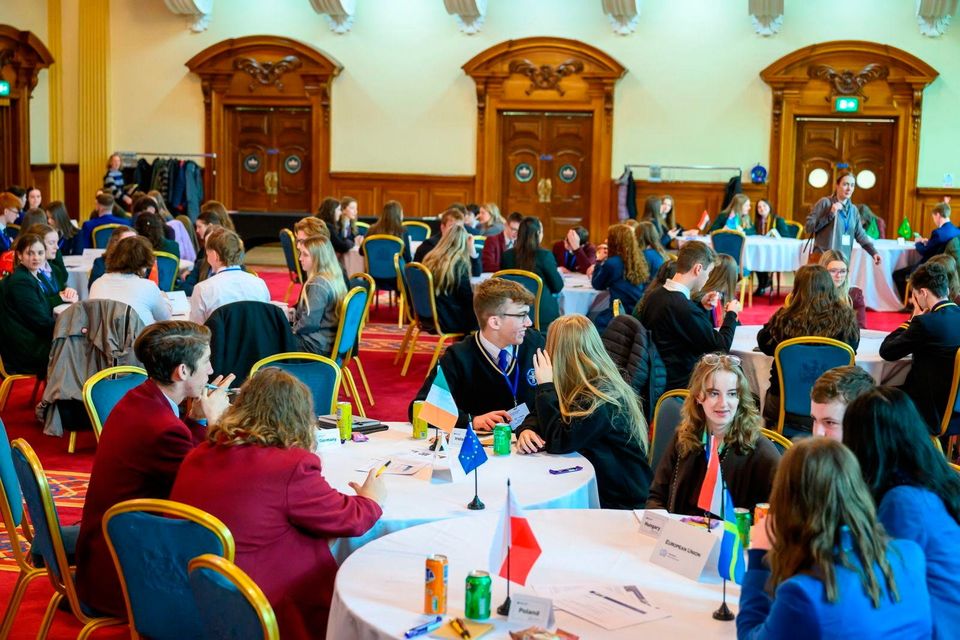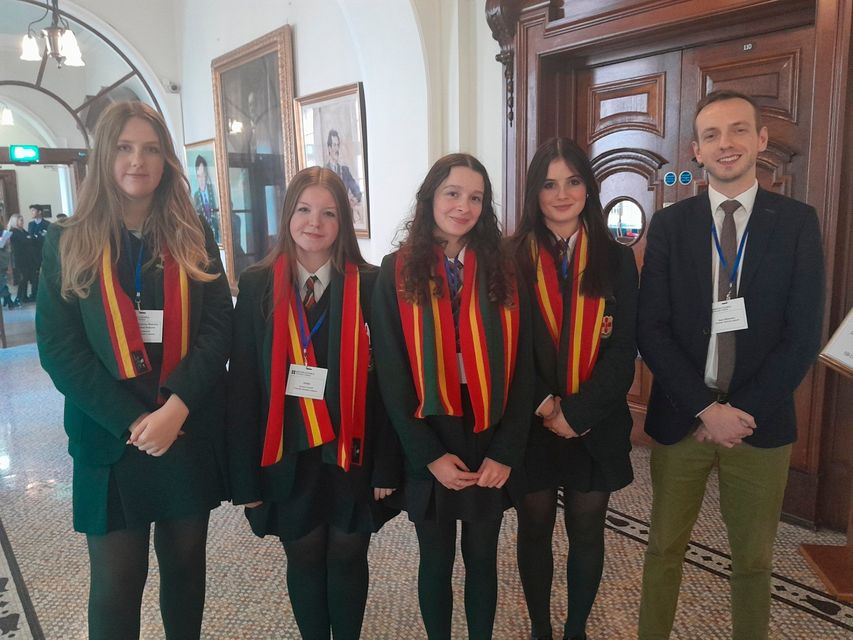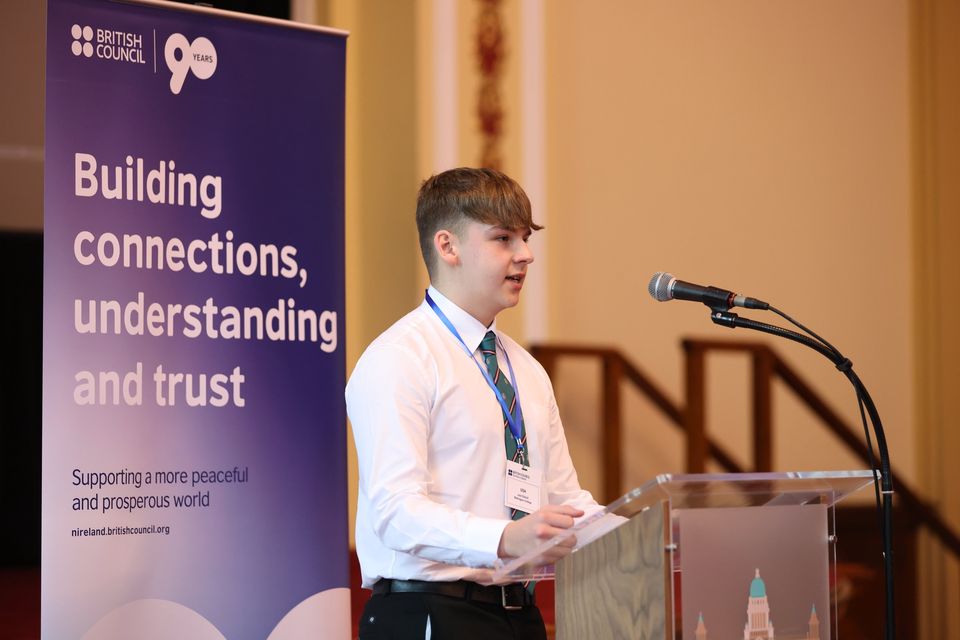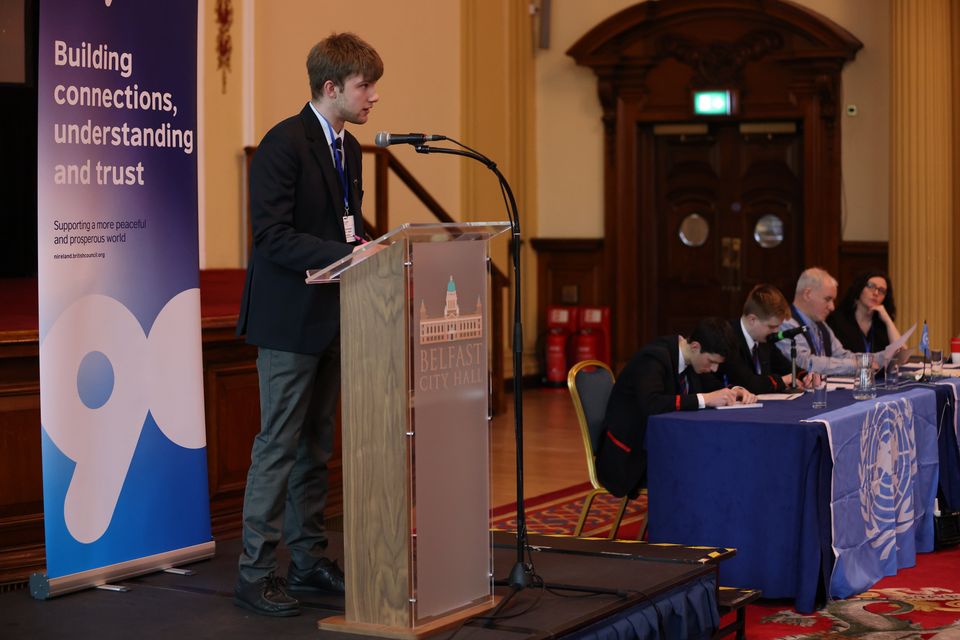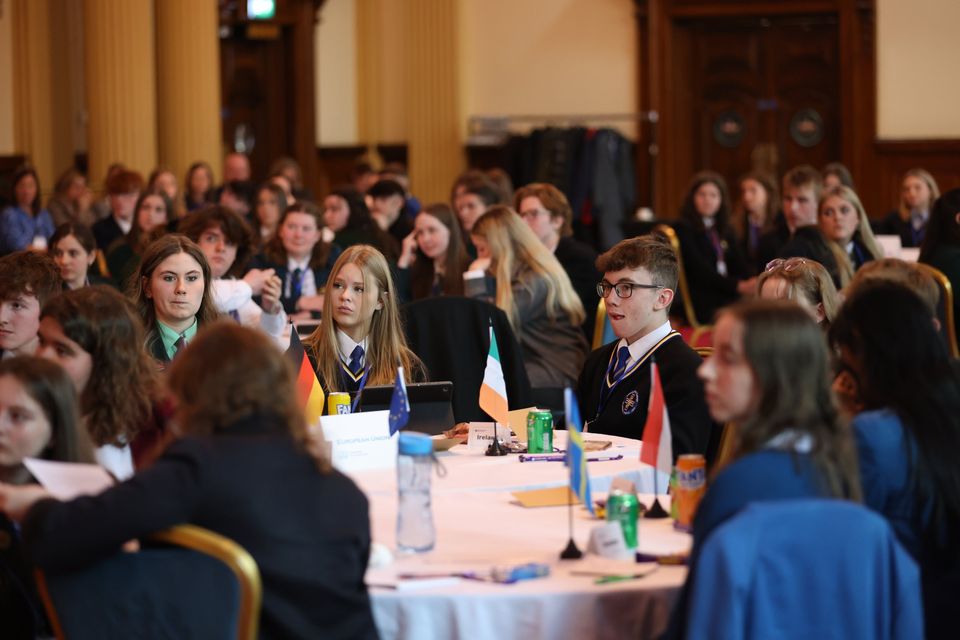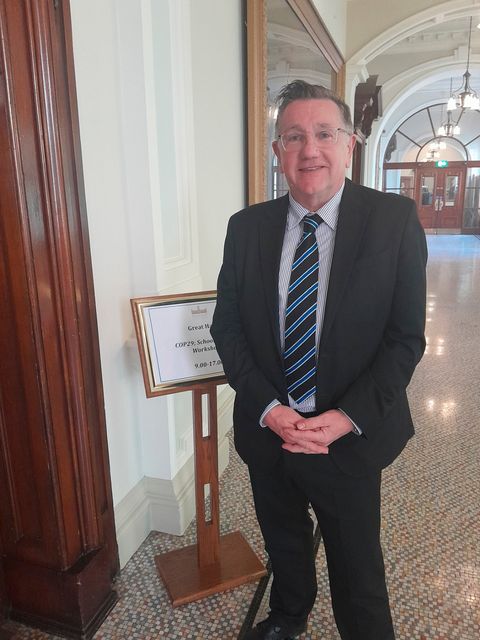Almost 150 pupils from 45 schools took over City Hall in Belfast yesterday with the world’s climate crisis firmly on their radar.
The students were all taking part in a major event to coincide with Cop 29, currently taking place in Azerbaijan as they honed their negotiating skills by taking on roles representing various countries, lobbyists and the media.
Organised by the British Council NI, through the Department of Education’s International Education Programme, the event used simulation software to create a real-world negotiation scenario for the pupils to immerse themselves in.
Pupils from 45 schools were involved in a simulation of climate negotiations, the event at Belfast City Hall run by The British Council NI to coincide with the COP29 summit in Baku, Azarbaijan.
The events are designed to support the next generation with developing essential skills in diplomacy, debate and the ability to think internationally — all needed to tackle the climate crisis — as well as being an innovative new way of bringing climate to the curriculum.
Among those tackling the complex challenges of international climate diplomacy aimed at keeping global warming below 1.5°C were Jessica Hayes (17), Emma Brown (17), Emma Convill (17) and Molly Greenhill (17), all from Friends School Lisburn.
Pupils from Friends School Lisburn who attended the climate negotiation simulation at Belfast City Hall, run by the British Council NI: Molly Greenhill, Emma Convill, Emma Brown and Jessica Hayes, with teacher Dr Mark Williamson.
“It has been interesting to see how different countries have to work together to solve their issues,” said Emma Brown.
“We’re all part of our Eco committee at school as well, so even learning things like how we can even make a small difference in our own lives has been really positive.”
“We’ve been surprised by how many things have to be considered by so many countries if agreements are ever to be reached,” she added. “Learning what’s possible, what’s not possible has opened our eyes to the complexity of the situation the world finds itself in.
”We’ve learned that everybody has to be in this together if we are all going to make a real difference,” added Jessica. “Countries needs to look past self interest and see what needs to be done for the good of everyone.”
Jack Dalzell from Wellington College speaking at COP 29 Student Climate Negotiation Simulation at Belfast City Hall, Tuesday, Nov 19, 2024. Picture by Peter Morrison
Read more
Also involved in the conference were Pawel Czylok (16) and Jude Wilson (16) from Lurgan College, who took on the role of the UN Secretaries General, helping to convene the debate.
Pawel kicked off proceedings with a stark warning and a message close from close to home.
“We’ve all heard about the major flood recently in Valencia, Spain, but you may not have heard about the recent flood in Poland — where my family is from — where it destroyed homes and livelihoods,” he told pupils.
“This just shows that not each story gets the same media coverage. In Libya, with Storm Daniel last year, they had 18-months of rain falling in one day — leading to a catastrophic flood killing over 20,000 people.”
Pupil William Mulligan speaks at the COP 29 Student Climate Negotiation Simulation at Belfast City Hall, Tuesday, Nov 19, 2024. Picture by Peter Morrison
Jude Wilson added: “This devastation shows that those who are least responsible are the most effected by climate change, and is clear injustice. At events like this we can get our voices heard. We are privileged to be here – we all have a responsibility, so let’s make a difference. And that’s something we need those in power to hear our views,” he added. “While it is fantastic to have a platform like this to learn from and air our views, we need the people who are making the big decisions to think about what legacy they are leaving for people like us who their decisions will affect more than anyone.”
Pupils listen to guest speakers at the COP 29 Student Climate Negotiation Simulation at Belfast City Hall, Tuesday, Nov 19, 2024. Picture by Peter Morrison
Jonathan Stewart, director of British Council Northern Ireland, said the day of debate and decision making was aimed at showing young people the intricacies of international negotiation, and allowing them to be at the heart of the conversation.
“As COP29 continues this week in Azerbaijan, these students are gaining crucial insights into the complexities of international debate on the climate, learning diplomacy and negotiation skills that will be vital for their future career pathways,” he said.
“This is showing pupils what it’s like to be involved in a process from so many different perspectives.
“It’s not simply about climate control, it’s about students learning negotiating skills, presentation skills and giving them a sense of exactly how much collaboration is needed on a global scale if we’re ever to make the decisions that will benefit the world we live in.
“Climate security is always high on the agenda for young people in any discussions we have with them,” he continued. “You can see from events like this that it’s a topic they are really invested in and really want to see something done on a world scale to address what they see as an environmental crisis.”
Jonathan Stewart, Director British Council NI
Speaking at the event, Dr Amanda Slevin said: “Young people have huge energy and drive and are keen to dive deep into the complexities of international climate negotiations and work toward consensus..
“This simulation event is great opportunity to gain insights into both the scientific foundations of the climate crisis and the intricate dynamics of COP negotiations. These are the future policy makers and a generation who already know that activism for the planet is crucial”.
